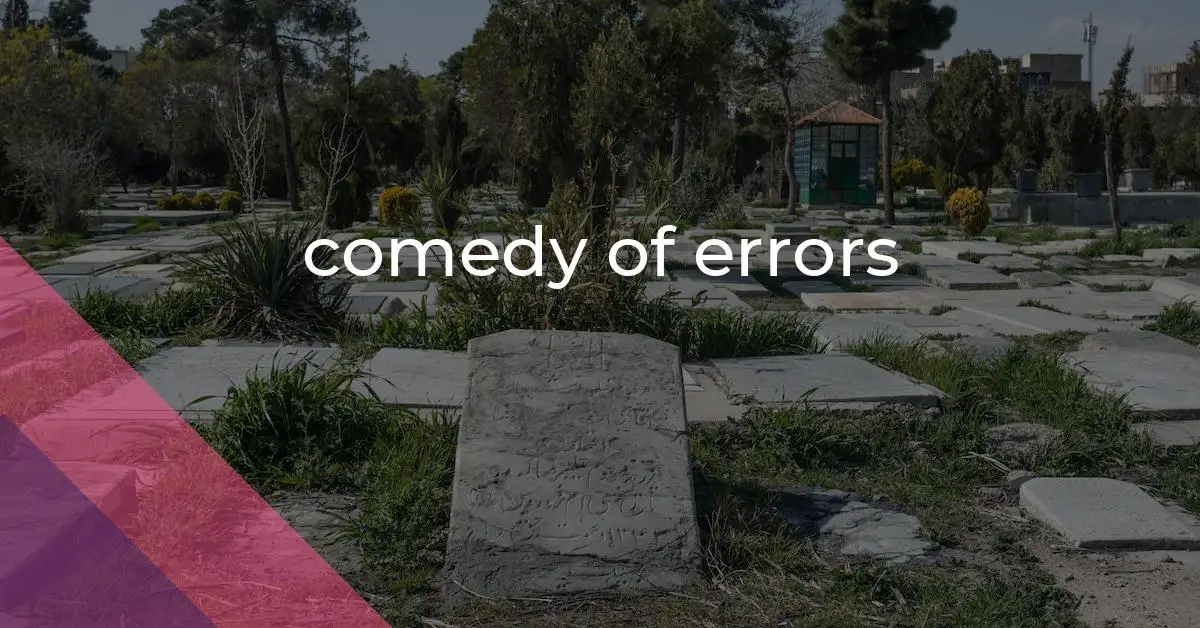comedy of errors: Idiom Meaning and Origin
What does ‘comedy of errors’ mean?
A comedy of errors refers to a situation where a series of mistakes or mishaps occur in a humorous or absurd manner.

Idiom Explorer
An idiom referring to a situation or event that appears to be chaotic, disorganized, or confusing.
The idiom "dumb luck" refers to a situation where someone achieves success or good fortune purely by chance or luck, without any skill or effort on their part.
The idiom "dog's breakfast" means a muddled or chaotic situation, typically used to describe something poorly done or disorganized.
The idiom "crap up" means to become messy or chaotic. It is often used to describe a situation or event that becomes disorganized or confusing. The phrase is informal and can be considered vulgar, so it should be used with caution in formal contexts.
The idiom "come a cropper" means experiencing a sudden and severe failure or mishap, leading to an unpleasant or disastrous outcome.
A "class clown" refers to a person who regularly makes jokes or acts silly in a classroom setting, often for attention or to entertain their peers, but may also disrupt learning.
The idiom *chalk something up to experience* means to consider a mistake or failure as a valuable lesson learned, rather than dwelling on the negative outcome.
The idiom "can of worms" refers to a situation or issue that is complex, difficult, or problematic, and is best left untouched to avoid further complications.
Hilarious Mishaps
The idiom "comedy of errors" is a commonly used phrase in English. It refers to a situation or event marked by a series of humorous or ridiculous mistakes or misunderstandings. The idiom's origin can be traced back to William Shakespeare's play "The Comedy of Errors" in the late 16th century.
The play revolves around two sets of identical twins who are separated at birth and later reunited through a series of mistaken identities and misunderstandings. This plot serves as the foundation for the idiomatic expression "comedy of errors," which has since been used to describe similar situations in real life.
So, what exactly does the term "comedy of errors" mean? Well, it's important to note that it falls under the category of idiomatic expressions. This means that its meaning goes beyond its individual words. Rather, it represents a figurative or metaphorical meaning that is distinct from its literal interpretation.
When someone refers to a situation as a "comedy of errors," they are highlighting the comical and often absurd nature of a scenario characterized by a series of mistakes or misunderstandings. It's like a chain reaction of hilarious blunders unfolding within a specific context.
Let me give you an example to better illustrate this idiom. Imagine a family going on vacation. They pack their bags, get in the car, and head off to an exotic Mexican breakfast destination. However, somewhere along the way, they take a wrong turn and end up in a completely different city. They realize their mistake, laugh it off, and eventually find their way back on track. This entire experience can be described as a "comedy of errors" because of the humorous and unexpected sequence of events that unfolded.
Speaking of Mexican breakfast, this idiom can be related to the phrase "Mexican breakfast" itself. Just like a "comedy of errors," a Mexican breakfast is often a mix of different ingredients and flavors that come together to create a unique and tasty experience. It's a playful and enjoyable combination, much like the humorous mishaps and blunders that make up a "comedy of errors."
Another related idiom is "by mistake." When someone uses this phrase, they are acknowledging that a particular action or outcome was the result of an unintentional error. This idiomatic expression aligns closely with the concept of a "comedy of errors" since both emphasize the element of mistake or error and the humorous nature that often accompanies it. In fact, the series of missteps and misunderstandings that characterize a "comedy of errors" can be seen as a collection of things going wrong "by mistake."
Finally, let's explore the connection between a "comedy of errors" and a "bad joke." While the two may have different connotations, they share a common thread of humor. Much like a "comedy of errors," a bad joke elicits laughter and amusement, albeit for different reasons. A bad joke may not be intentionally funny, but its failure to generate the desired response creates a comedic effect. Similarly, the mistakes and misunderstandings that occur within a "comedy of errors" may not be intended, but their unexpected and ridiculous nature generates humor and amusement.
So, to summarize, the idiom "comedy of errors" refers to a situation or event marked by a series of humorous mistakes or misunderstandings. It originated from Shakespeare's play "The Comedy of Errors" and has become a widely used phrase in the English language. This idiom captures the essence of comical mishaps in various contexts, whether it's a chaotic family vacation, a string of unintentional errors, or even a bad joke that falls flat. Its enduring popularity reflects its resonance with people around the world, transcending geographical boundaries and cultural differences.
Example usage
Examples of how the idiom "comedy of errors" can be used in a sentence:
- Our family vacation turned into a comedy of errors, with missed flights, lost luggage, and a wrong turn that landed us in the wrong city.
- During the school play, there was a comedy of errors as props were misplaced, lines were forgotten, and actors stumbled on stage.
- The dinner party became a comedy of errors when the host accidentally spilled wine on the guest's dress, the oven stopped working, and the dog stole food off the table.
More "Mistakes" idioms



